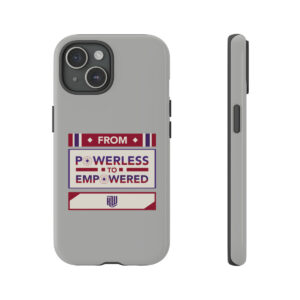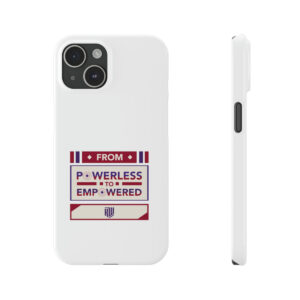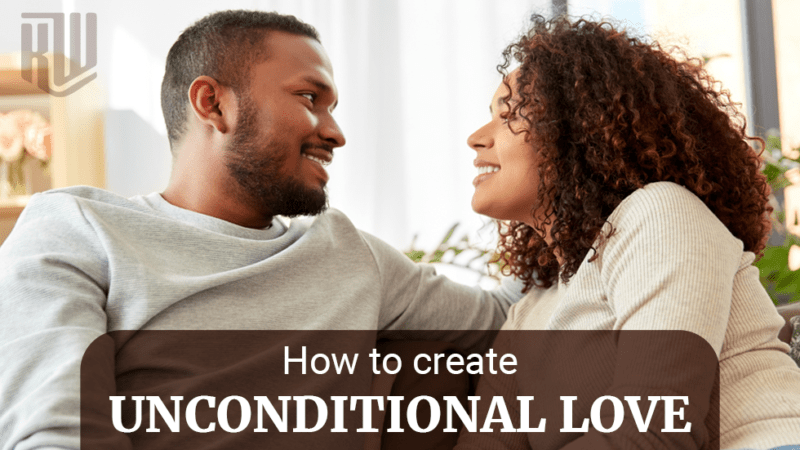What’s always confused me about the concept of unconditional love are the buzzwords people use to define it?
Words like kindness, support, and trust, but what do any of those really mean? What is kindness, and how do you know when someone is kind? The same questions apply to all of the common buzzwords. No one ever talks about this . They dump the words and exclaim, do those things, and you will create unconditional love.
But how do you actually display each one? That’s what this article is about: the how.
There is a process to create unconditional love – it’s something we have to learn.
For me, the single most important aspect is safety, and not in the way most people think. Most people think about their partner being safe.
I don’t see it this way. In my experience, the only way we get safety is to have it within ourselves.
Until I’m safe, how can I bring unconditional love into me, express it, and accept it?
Then the question becomes: how do I become safe? In all fairness, this article could be a book. So, I’ve picked the most significant keystones to create safety that fosters unconditional love.
The first aspect in generating personal safety is that we have to know our morals, values, needs, wants, negotiable’s, and non-negotiable’s.
Most people will immediately say they know these, but have you ever sat down and written these out in every area of your life? Your relationship, career, friends, hobbies, parenting, spirituality, politics, and all the rest?
I see this in clients all the time, and it was true for me. Unfortunately, I was never taught this exercise, so I ended up married to someone with the exact opposite political, intimacy, hobby, and child-rearing beliefs.
More focused
Most people get into a relationship because they are more focused on feeling a spark and a sense of physical chemistry. Then, years later, they break up and lament how many morals, values, needs, and wants they did not have in common.
Even the simple little things: do you need a clean house, or are you OK with it messy? That’s a need and a want. Now, is it negotiable or non-negotiable for you?
After doing this exercise
I discussed this exact topic with my second wife – we could find a tolerable level for both of us. If I know exactly what works for me, I know what to communicate to you about what works and doesn’t work. That’s safety.
This is a major contributing factor to divorce: people haven’t laid these out and end up in a relationship with someone who has non-negotiable traits.
Keep in mind that all of these will change throughout your life: you might pick up a new hobby, change careers, or even change political parties.
Therefore, it would be best to keep this as a living document, updating it yearly.
Second aspect
The second aspect is boundaries. Most importantly, the ability to say no. We’ve been taught a lie to do and be everything for our partners.
Always supporting them and being on their side. What if your partner decides to be a serial killer? You won’t support them and say yes then.
Saying yes is the most contributing factor that ends a relationship because it is conditional and not truly loving. Looking back at your past relationships:
why did you break up? In my experience, when describing the end of the relationship. Every person exclaims what they did for the other person and laments how they did not get certain things in return.
That means they said yes to their partner only to manipulate and get something in return. It wasn’t unconditional! It had a price tag. We keep score and become resentful. Before we ever say yes.
we want to ask ourselves three simple questions.
1- Will I keep score that I did this for them?
2- Will I bring it up in the future and throw it back in their face?
3- Will I have resentment if I get nothing in return?
You can see all three questions are basically the same thing, but we all classify them differently. So if we think we might have any of those reactions.
we have to say no if we want to be trusted. A partner who says no to you also means they are kind because they will not hit you over the head with the “yes” at a later date.
That’s safety. The ability to say no must be present to create unconditional love. As I always say:
The most loving thing we can ever say to anyone is “No.”
The next tool a couple needs to create safety that results in unconditional love is a confrontation model: a way to fight.
A way to express themselves that doesn’t destroy the other person.
Sadly, I’ve found that virtually no couple has one. If you would like to learn a confrontation model that makes fighting one of your favorite experiences and turns every fight into a deeper connection.
I suggest watching my YouTube video titled “How To Fight Fair & Save Your Relationship” for the full process.
The last piece is something most people don’t want to hear, talk about or face. but it’s impossible to create unconditional love unless both people are committed to doing trauma work on their childhood.
Unfortunately, the level of denial in society about childhood and the wounds we all carry is the single greatest reason the world and relationships are in their current state.
To believe our childhood was perfect means we aren’t in reality.
We are all human – none of us were raised by a perfect God. Bear in mind: the first psychology book was written in the 1870s, but it wasn’t until the 1970s, with the advent of TV talk shows.
That we really started to talk and research what healthy parenting looks like openly. Studies also show that 70% of all childhood messaging was negative, disempowering, and self-sabotaging.
No matter how great our family and childhood were, those messages are what are logged in our subconscious.
Studies also show that 95% of our daily lives are just reliving the subconscious pattern we learned in childhood as adults. I know we think that we’re an adult and making our own decisions.
But unless we’ve done massive amounts of work, we’re not and even worse, we don’t recognize that this is true for us all. Instead, we will deny it and shrug it off.
This is not meant to disparage parents because each parent was taught by the parent before, so where would the blame end? There would be no reconciliation.
Instead, it’s about reality and responsibility. Admitting the truth that we all experience childhood pain and are still reliving it brings us all together: it’s a shared experience.
We have to own it as a society and see it as a joiner, not a separator. There’s love, trust, and truth in that without malice and hatred. It has empathy.
Healing our childhood trauma is essential to creating unconditional love.
There is an even deeper, more profound benefit created by healing our childhood trauma. Childhood trauma creates an emotional chemical addiction that our brain and bodies seek to repeat until we heal it.
Can you see what this means about every fight and disagreement? Since we are all reliving our childhoods and stuck in our subconscious.
All fights are just an attempt to reconcile the unhealed pain from the past. It actually has nothing to do with the other person. They are just a proxy we have chosen to teach us that we need to face our pain.
When we know that truth, we recognize we picked this person because they remind us of our trauma. Therefore, when we get angry or frustrated,
we can ask ourselves why we wanted this in our life – after all, we picked this person!
I’ll give you an example of what this looks like in action. My first wife was physically and verbally abusive. I would never condone that, but I adore her now, and here is why.
Once I did the work, I saw she was my teacher. I had a family member who was verbally and physically abusive in my childhood .
I was reliving the trauma I had never healed. I’m not condoning what she did, but it shows me that she was all I was capable of picking at the time because my brain and body.
And subconscious had not been healed. When I discovered this and did the healing work, I was free and had total forgiveness.
I see now that she loved me perfectly for who I was at the time. The healing process allows us to recognize everything I hate about you is everything I haven’t healed in me. That creates a connection and ends the disconnection.
There are two more things to recognize:
the first is unconditional love takes time. It’s not immediate. Because of our imperfect childhood, our parents placed many conditions on us.
We have to go learn how to do this unconditionally, and that takes time. Whether we’re 20 or 60, since we are all stuck in our childhood subconscious, a relationship consists of two children.
A huge maturation process needs to occur, and we get to choose to do that together. I know this sounds demeaning, but it is not my intent. I want to bring light as to why we can’t find unconditional love.
Finally, there’s one last piece to the puzzle. Everyone goes into relationships not wanting to lose the other person.
They want to guarantee that person will be there for the rest of their life. That’s ideal but many times impossible. Furthermore, that’s a child’s fantasy.
Unconditional love can’t happen from that place, and here is why. Our morals and values are living documents. If you’re 40 years old, think of how much your morals and values have changed in your life.
Therefore, unconditional love is the recognition that the best I can ever do and expect is that today, I love you. I can only guarantee today because I am ever-evolving, changing, and growing.
My morals and values shifting is not a rejection of you; it’s an empowerment of me by pursuing the best version of myself. If I’m pursuing the best version of myself, that’s safe for the other person.
They can evaluate if I still align with them. And if I don’t, they’ll love me enough to say no and not try to change me or have resentment towards me.
So then, I won’t see it as a rejection of me – it’s not about me.
Their facing the pain from their past, telling me no, and expressing their morals and values gave me safety every single day.
I am grateful for one hour or a hundred years of unconditional love if that’s all we are aligned for.
The best we can ever give anyone is today. Nothing more. When that becomes our view of unconditional love, we’ve arrived. Now we’re safe, not only for ourselves but for others.
Enjoy The Journey??
You Deserve to Have a Deeply Committed, Loving Relationship.
The five core elements of having your dreams’ a deeply committed, loving relationship free from codependence, are here waiting for you.
This class teaches you how to create deep emotional connections that bring you and your partner closer together than ever before.
While also teaching you how to heal pain from the past, so your relationship is free from codependence.
First, we remove the intensity and fear of commitment by building intimacy, love, support, understanding, appreciation, and mutual respect instead of disconnection or distance between each other.
Then learn a simple, straightforward process to apologize and forgive your partner so that they can feel safe again in their relationship with you.
Finally, it’s time for something new! A better life awaits if only we take action now!
We have everything you need right here at our fingertips .
All it takes is just one click! So join us today and start your journey towards creating more meaningful relationships through learning how to fight fair together as partners in crime who will always be there when needed most!
This is not about being perfect but rather about being real – which means taking responsibility when things go wrong without blaming or shaming each other to move forward together into a brighter future filled with happiness & joy!
Sign up today and create the lasting love and connection of your dreams!




